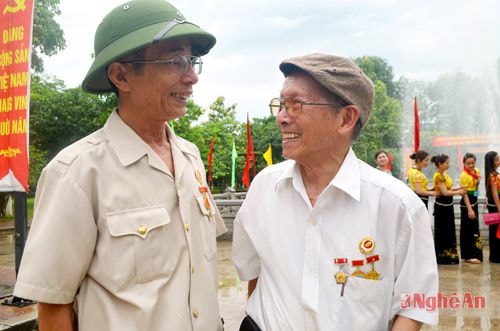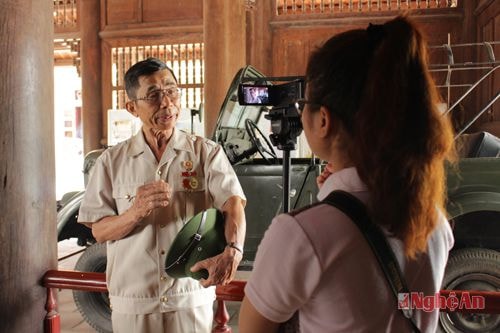Appointment in the Common Hometown
(Baonghean) - One person comes from the Central Highlands and the other lives in Vinh City. In May, the sky and land of Nam Dan are vast and green, with a gentle scent of lotus, like a promise from their souls to join the stream of pilgrims returning to Uncle Ho's hometown. Quietly placing white lilies on the altar, offering the spirit of the Father of the nation. They cry. The tears of men who have gone through the fierceness of war, gone through the years of nearly a lifetime, are somehow strange, something tearful... And the chance meeting of two veterans, two former prisoners captured by the enemy years ago, the tight handshake between them right in Sen village helped us realize their "specialness" to rewrite this story...
Memories of Uncle Ho's memorial service in prison
The veteran from Nghe An is Mr. Nguyen Nhat Thang (Block 12, Cua Nam Ward, Vinh City). He said that his life was like a soldier's novel, with heroism, tragedy, loss, sacrifice and bursting happiness. Amidst those thousands of layers of emotions, he never once shed a tear. However, when standing in the peaceful village, in front of the simple thatched roof house, he could not hold back the sobs of his heart. He cried. When the memories of those years, associated with the memory of President Ho Chi Minh, came flooding back...
Decades ago, Mr. Nguyen Nhat Thang (operational alias Pham Van Thang) was a prisoner of Phu Quoc prison - the "hell on earth" of the US - puppet regime for loyal revolutionary soldiers. He was captured when he was the Platoon Leader of Platoon 1, Battalion 15, Division 324, assigned to coordinate with Battalion 4 Infantry to ambush the US Marines marching from Cua Viet to Khe Sanh (Quang Tri). After setting up the ambush position, at 1am, the enemy's armored vehicles advanced. After the order to fire, several vehicles overturned, our infantry rushed from the trenches to destroy the US soldiers. The battle was extremely fierce, with high mobility, our troops rushed forward, causing the enemy to be extremely confused and forced to huddle together to defend. The battle would have been very successful if our army's tail-locking explosive system had fired in time. Therefore, the enemy had a way to retreat, flee and call for reinforcements. Immediately after that, enemy planes swooped in, dropping bombs, encircling and causing heavy losses to our forces. The entire unit was ordered in groups of three to open a path of retreat to the West.
 |
| Mr. Nguyen Nhat Thang (left) and Mr. Nguyen An reunited in Kim Lien - Nam Dan. Photo: Thuy Vinh |
Not letting the wounded fall into the enemy's hands, on the way of retreat, in the midst of the enemy's firestorm, Platoon Leader Nguyen Nhat Thang carried his wounded comrades on his back while fighting back. Unfortunately, he himself was seriously injured before he could withdraw from the battlefield. The enemy's artillery shell knocked him unconscious, his whole body was covered in blood, and mud partially covered his body. When he woke up, he saw that many of his comrades had died around him. Then he was awake, then fainted, then had a dream, Nguyen Nhat Thang lay in the middle of the battlefield until the morning of the 5th day after the battle. Then he was taken by American soldiers to Dong Ha by helicopter for treatment. Before his wounds could heal, thousands of brutal tortures from the enemy came again. Nguyen Nhat Thang died and came back to life countless times. Unable to get anything out of him, in October 1967, the American government and its puppet henchmen put him on the list of stubborn prisoners and exiled him to Phu Quoc prison.
There is a memory, which is also a concern he carries with him throughout his life, that is the memory of Uncle Ho's memorial service right in the colonial-imperialist prison after his death.
“At that time, the prison cell was only about 9 square meters wide. The ceiling was low, the cement floor was full of dirty water, and the living conditions were extremely bad. That day, the revolutionary prisoners were living normally when a prison guard came to the window and said: “We just received news that Uncle Ho passed away. The leader has passed away, you must surrender!” Everyone was shocked, but then reassured each other, perhaps it was just a psychological warfare trick of the enemy, and it was not easy to listen to it” – Mr. Nguyen Nhat Thang recalled. But then, information about Uncle Ho’s passing was transmitted by our secret base. “Uncle Ho has really passed away. Really… The prisoners in the cell were stunned. It was not until late afternoon that we continued to receive secret orders from the provisional Party cell to hold a memorial service to remember Uncle Ho!”
And that secret ceremony took place in a small cellar, with only a flicker of light from the lights outside the prison. The steadfast revolutionary soldiers, through many enemy attacks, stood up together, facing the North. The homeland North, the beloved North, had the image of Uncle Ho and the peaceful sky in their minds. In prison conditions, there were no flags, no flowers, not even a small picture of Uncle Ho, but in each person’s heart, the image of Uncle Ho was still intact, and just like that, the National Anthem resounded…
You have helped brighten my heart
Among the pilgrims returning to Uncle Ho's hometown that day, everyone saw an old man with a small frame, a broad forehead, and limping steps. In the large yard of the President Ho Chi Minh Memorial, the old man occasionally stopped and looked around. It was as if he wanted to preserve for a long time the images he saw in his eyes. That was Mr. Nguyen An, a veteran of the Revolutionary Soldiers Association who was captured and imprisoned by the enemy and came from Da Lat City.
 |
| Mr. Nguyen Nhat Thang talks with Nghe An Newspaper reporter |
Mr. Nguyen An said that he was originally from Khoai Chau, Hung Yen but was born and raised in Hanoi. And in Hanoi, on Hang Duong street, the "rich kid" An could have chosen for himself a path to adulthood with Western education in the French educational environment at that time. But no, the meeting that Mr. An said changed the thinking and brightened the heart of the young man from Hanoi was the first time he met Uncle Ho. That was in early 1946, at that time Nguyen An was 19 years old, a self-defense member of Hanoi in charge of the Ly Thuong Kiet National Salvation Youth Team.
In the boiling atmosphere before the day of resistance against the French, the whole of Hanoi was filled with revolutionary spirit. Nguyen An's National Salvation Youth Team went to every street, to every street corner to propagate and mobilize people to join the revolution, support the self-defense force, the National Guard to break down walls and fences, dig and build fortifications to prepare for resistance against the enemy. The positivity and enthusiasm of Ly Thuong Kiet National Salvation Youth Team was known and praised by Uncle Ho.
At the Hanoi Opera House, Uncle Ho had a talk, praising the youth of the capital, including the team led by Nguyen An. And that was the first time in Nguyen An's life that he met Uncle Ho. "Uncle Ho spoke softly, his eyes were bright and full of affection. Every gesture of his exuded politeness and simplicity. He looked at each person, I felt in his eyes there were worries, full of love, pride and trust. Right at that moment, I knew I had really changed", Mr. Nguyen An wiped the corner of his eyes and recounted. Then on December 19, 1946, the day President Ho Chi Minh called for national resistance, Nguyen An was officially admitted to the National Guard, becoming a soldier of Company 101 of the Capital Regiment in charge of the front against the enemy at O Quan Chuong. Hand-to-hand combat, blood-stained walls, fallen soldiers still holding their guns high, enemy corpses exposed on armored vehicles… Hanoi's winter of 1946 was like a steaming fever.
In a battle in February 1947, Nguyen An was seriously injured and forced to stay in the inner city while the forces withdrew from Hanoi to the resistance zone. Immediately after that, he was captured by the enemy and imprisoned for 2 years in Hoa Lo prison from 1947 to 1948. During those 2 consecutive years without being allowed to go out, without seeing the sunlight, the only thing that helped the young man from Hanoi to remain steadfast and bright-hearted was his belief in Uncle Ho and the revolution. And for a person like Nguyen An, it was even more special when his father was a civil servant of the French plenipotentiary regime. “I left my family to follow Uncle Ho, following the right call of my heart, my younger brother also went to Viet Bac to join the resistance. My grandfather knew that but he did not say anything. I believe he also understood. History and time have not proven it,” said Mr. Nguyen An.
In 1949, because the secret police in Hanoi were closely following him, and he was seriously injured, Mr. Nguyen An went to Da Lat, fearing that he would be implicated in other people's actions. Before that, his father was also transferred by the government to work at the Da Lat Map Office. Here, Mr. Nguyen An, under the cover of being a war victim, was accepted to work at his father's agency. With his painting ability and the guidance of his father, Nguyen An quickly gained the trust of everyone. From here, he joined a secret society by printing and copying maps, providing information to the revolutionary base in Lam Dong.
Meanwhile, Mr. An's wife, who did business at the market, regularly supplied food and necessities to the revolutionary forces operating secretly in the area. By 1951, the enemy sensed and suspected that there were Viet Minh forces in the Map Department, so they arrested, imprisoned, and beat many employees in the drawing team. They murdered Mr. Vo Sanh - the team leader, who directly guided and directed the members participating in the secret force. Nguyen An himself was imprisoned by the enemy for 3 months in Da Lat prison. After many times of beating and interrogation, the Nha Trang Court sentenced Nguyen An to 2 months of suspended imprisonment. After his prison term ended, Nguyen An was re-employed at the Map Department and until 1975, when the government returned to the people, Mr. Nguyen An made a great contribution in handing over intact documents, information, and military and administrative maps that he had collected and kept during his years of working there.
This year, he is 89 years old and this is also the first time Mr. Nguyen An has been to Nghe An, to visit Uncle Ho's hometown. He said that he will never be able to rest in peace if he has not seen Uncle Ho's hometown with his own eyes, and fulfilled his promise. Then he stood hesitantly in front of Uncle Ho's house, gently touching each roof panel. Then he wiped away his tears, and solemnly clasped his hands before each altar in the Kim Lien Relic Complex. In the sunny sky of a May day, that small figure walked unsteadily, the stick already shiny with sweat as if touching the sun's back. There was something stirring behind the frangipani petals, a passionate color. Outside, the lotus had also bloomed. Kim Lien was fragrant.
Dao Tuan - Phuong Chi
